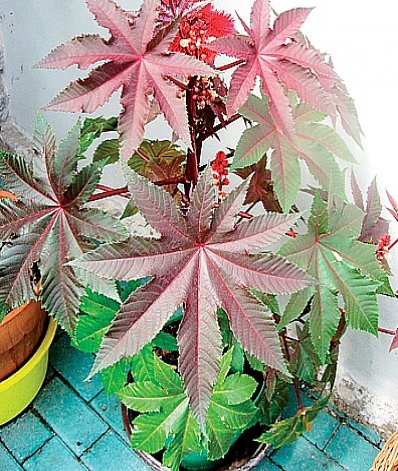Phuket Gardening: Dangers in the Garden of Eden

PHUKET: Everyone knows that some plants are poisonous, and we gardeners in Phuket know that Thailand has more than its fair share. In truth, the Kingdom also has more than its fair share of edible species – as this column has frequently documented.
Although you are hardly likely to attempt to eat any part of the following toxic plants, do wash your hands after handling any of them.
The list includes some of the most beautiful shrubs around: most of the apocynaceae family such as oleander and thevetia, allamandas and euphorbias (including the crown of thorns), the shade plants diffenbachia (dumbcane) and caladium (elephant ear), the adenium or desert rose, the angel’s trumpet (brugmansia) and, deadliest of all, the castor-oil plant (ricinus).
Most of these plants have toxic sap which is whitish, sticky and latex-like, but in the case of the castor-oil plant, it is the seeds that are deadly. At least only the castor-oil plant has tempting-looking berries to attract the attention of curious children.
Other dangers in your personal Garden of Eden have more to do with its fast moving inhabitants. We all know about mosquitoes. What makes them so irritating (in more senses than one) is the fact that the female anopheles tends to be most active in the early morning, or before the sun starts to go down. And these, of course, are the coolest times for watering your garden, or for undertaking more strenuous tasks, such as an evening stroll.
Moreover, since mosquitoes tend to hide behind vegetation, any disturbance tends to arouse their blood-sucking desires. And they are, so recent research reveals, especially attracted by the odors emanating from feet!
Any water plant pots should also provide a home for fish such as swordtails: they will ensure that none of the mosquito eggs dropped into the water develop into larvae. Stagnant water without fish will rapidly become a breeding ground.
At the expense of a few fish, you might even encourage dragonflies. Their larva are vicious aquatic predators with a retractable claw, but if you have a few brilliant-hued adults quartering your swimming pool, you can be sure that they will mop up most mosquitoes in the vicinity.
Ants are maybe worse than mosquitoes. They seem to patrol any number of plants, often protecting the aphids, which suck sap from plant stems and produce a sweet substance called honeydew, much beloved of their guardians.
If you happen to disturb other species, (some red ants nest in trees and large shrubs), they are liable to attack without warning. I once attempted to knock one of their football-sized nests from a tree. The result? I was dive-bombed by hundreds of angry ants and got at least twenty stings for my pains. And some people, myself included, are allergic to the formic acid in ant stings. Bring on the anti-histamine tablets.
Finally a warning about leaf litter. If you need to collect the dead leaves which are now steadily accumulating in the current dry season, make sure you either use a rake, or wear gloves if you intend to pick them up by hand. Why? There may be all sorts of nasties lurking underneath the foliage.
Centipedes can deliver a very unpleasant bite – millipedes will not, but they are full of cyanide, and should not be handled. Nor should you pick off hairy caterpillars, which can bring you out in an unpleasant rash.
One furry larval creature, bright green in color, blends with the underside of a leaf so as to be almost invisible. What it turns into, I have yet to discover, but one touch and the resulting rash will last a long time.
And remember, there are scorpions and serpents in Eden.
Phuket Gardening is Phuket Gazette columnist Patrick Campbell’s feature of all things flora.
If you have a question or a garden that you would like featured, you can email Patrick Campbell here.
Keep checking our online Phuket Lifestyle pages for regular gardening features and tips.
— Patrick Campbell
Latest Thailand News
Follow The Thaiger on Google News:


























